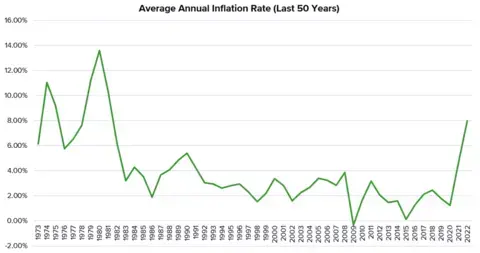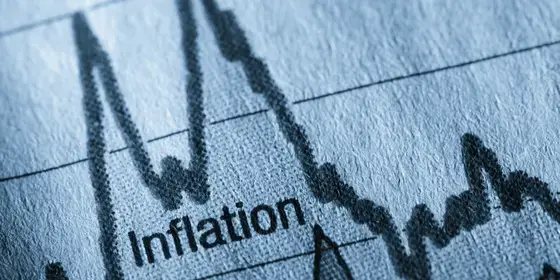Along with investment market volatility, high inflation has recently been a persistent concern for investors. In March 2023, The Federal Reserve added fuel to that fire by signaling its readiness to ramp up interest rates in response to a string of red-hot economic reports.
Inflation is the rate at which the general prices for goods and services rise. It can be contrasted with deflation, which is a decrease in the general level of prices for goods and services, and stagflation, a period of high inflation and stagnant economic growth. As an investor, understanding inflation and planning for its impact on your portfolio is essential to making informed financial decisions.
Jerome Powell, the Federal Reserve chair, recently told Congress that while the Fed raised its target interest rates from near zero to above 4.5% last year to cool down inflation, new data suggests that economic activity has heated up again. This means that we can expect the ultimate level of interest rates to be higher than many of us previously anticipated.
What does this mean for investors? The Fed plays a crucial role in managing inflation through its monetary policy decisions. Inflation can put a dent in your savings and investments over time, so it's important to stay informed and make smart financial decisions. Regular portfolio reviews and diversifying your assets can help you and your advisor create strategies to mitigate inflation’s impact on your investments.
Take the first step towards financial security. Click here to schedule your free consultation with our experienced advisors.
Why Does Inflation Matter?
Inflation can cause havoc in the economy and decrease purchasing power over time. It's essential to understand inflation to protect your wealth and achieve your financial goals. Inflation can lead to higher prices for goods and services in the short term, affecting consumer behavior and the overall economy. For instance, if consumers expect prices to keep rising, they are more likely to buy goods today in anticipation of price increases instead of saving. Likewise, when manufacturers anticipate that the cost of their raw materials will increase, they will increase the price of their goods to maintain their profits. In the long term, persistently high inflation significantly decreases purchasing power, eroding the value of your savings and investments and decreasing your wealth over time.
As an investor, the more you understand inflation, the more options you will have to protect your wealth and meet your financial goals.
History of Inflation in the U.S.
Historically, there are numerous examples of how inflationary periods affected different asset classes. In the 1970s, the U.S. experienced a period of high inflation, which resulted in a decline in real stock market returns and an economic recession. To combat the high inflation rates, the Federal Reserve, under the chairmanship of Paul Volcker, aggressively tightened monetary policy, resulting in the federal funds rate being close to 20%. While the economy fell into a recession in the early 1980s and the rate of unemployment increased, the actions taken by the Federal Reserve were necessary to bring inflation under control and stabilize prices.
Figure 1. Average Annual Inflation Rate Since 1973

Source: U.S. Bureau of Labor Statistics
With a target of 2%, inflation remained relatively low for the last four decades. The Fed has implemented policies to keep inflation under control, including keeping interest rates low and using quantitative easing. However, inflation has risen sharply in recent months due to factors including supply chain disruptions, labor shortages, and government stimulus spending.
How Inflation Impacts Your Finances
High inflation can seep into every aspect of your finances and impact you in various ways—in both the short and long term. Here are a few ways high inflation can affect your overall financial health and what you can do to mitigate its effects:
Retirement Savings
To reduce the effects of inflation on your retirement savings, it's important to consider different asset classes. For example, in high inflationary environments, the purchasing power of income received from bond investments decreases. At the same time, high inflation rates lead to interest rates increasing, driving the price of bonds higher. Essentially, you get back less money from bonds and have to pay more to invest even further.
Stocks are also negatively impacted. As corporate profits and growth slow and consumers spend less, investor confidence decreases, which might lead to irrational trading behavior.
Portfolio Planning
It's important to diversify your portfolio to protect against the impact of inflation. Investors should consider allocating assets to inflation-protected securities—such as Treasury Inflation-Protected Securities (TIPS) or inflation-linked bonds—to mitigate the effects of inflation on their fixed-income investments. Work with a financial planner to identify safe fixed-income securities with an ideal duration. Investing in commodities, which often perform well during inflationary periods, can also help diversify a portfolio.
Taxes
The tax burdens of investors can be significantly affected by inflation. For example, as the cost of building a home increases with inflation, the value of homes also rises in the short term, leading to higher property taxes. Even individuals who receive a cost of living adjustment (COLA) may be pushed into a higher tax bracket, resulting in higher tax liabilities without any actual increase in purchasing power. Inflation can also impact Social Security taxes, which are payroll taxes used to fund Social Security. The wage base for Social Security is indexed for inflation, meaning that higher inflation can increase the wage base and ultimately result in higher Social Security taxes. For instance, in 2022, the Social Security wage base, the maximum income taxed for Social Security, was $147,000; in 2023, it rose to $160,200.
Estate Planning
Inflation can have an outsized impact on estate planning. Because inflation erodes purchasing power over time, assets left behind for beneficiaries could lose value in real terms as it erodes the value of assets over time. As a result, less wealth is transferred to heirs. Thus, it is important to invest and protect your assets in such a way that it protects against inflation.
Planning and using inflation-protected investments that will appreciate over time can help preserve an estate's value and ensure that assets are passed down to beneficiaries as intended. Proper planning and regular evaluations with your advisor can help lessen the impact of inflation on an estate plan.
Insurance
Inflation can affect insurance needs by increasing the cost of insurance premiums. As the cost of claims and services increases, insurance providers may raise premiums, burdening policyholders. It's important to regularly review insurance policies and coverage levels to ensure that insurance needs are met. As the value of assets changes over time, it may be necessary to adjust insurance coverage to ensure that coverage remains appropriate. With inflation eroding the value of assets, it's essential to stay informed and consider these things when evaluating risk management and insurance to avoid being underinsured or overpaying for coverage.
Manage the Tax Consequences of Inflation
Investors have several ways to mitigate the potential tax impact of inflation. Invest in tax-efficient accounts, like IRAs and 401(k)s, which can help minimize the impact of taxes on investment returns. Tax-loss harvesting is a strategy that can help reduce tax liabilities by selling losing investments to offset gains in other portfolio areas. Another strategy is to invest in assets that generate tax-advantaged income, like municipal bonds or qualified dividends. Finally, selecting the right mix of assets that, over time, will provide a return that exceeds inflation will protect your purchasing power and increase your wealth.
Collaborating with a tax professional or financial advisor can help investors make informed decisions on managing investments and minimizing the impact of inflation on taxes. By taking proactive steps to manage taxes, investors can help preserve the value of their investments through inflationary times.
Investment Strategies for Dealing with Inflation
While inflation is a fact of life in our economy, savvy investors have some options when it comes to dealing with these periods of high inflation:
- Diversifying assets can help investors spread their risk and ensure their portfolio is well-positioned to weather inflation. An appropriate asset allocation helps ensure your portfolio provides you with a long-term rate of return that exceeds inflation.
- Investing in inflation-protected securities, like TIPS or inflation-linked bonds, can help mitigate the impact of inflation on fixed-income investments.
- Planning for taxes and insurance in an inflationary environment is also crucial, as rising prices can increase the cost of both. Tax-efficient investments, like IRAs and 401(k)s, can help lessen the impact of taxes on a portfolio.
- Reviewing insurance policies regularly to ensure coverage levels remain appropriate is also essential. For example, if the value of your assets increases beyond your insurance coverage, you are at risk of being underinsured.
Many financial professionals have expected that inflation will continue well into 2023 and that it's already priced into the market. A relatively strong economy can also temper concerns about inflation. Ensuring that your financial plan includes a long-term, goal-oriented perspective can help you avoid rash decisions in response to short-term inflationary trends. Meet with an experienced Wealth Enhancement advisor today to learn more about incorporating some of the strategies above into your financial plan.
There is no guarantee that asset allocation or diversification will enhance overall returns, outperform a non-diversified portfolio, nor ensure a profit or protect against a loss.



